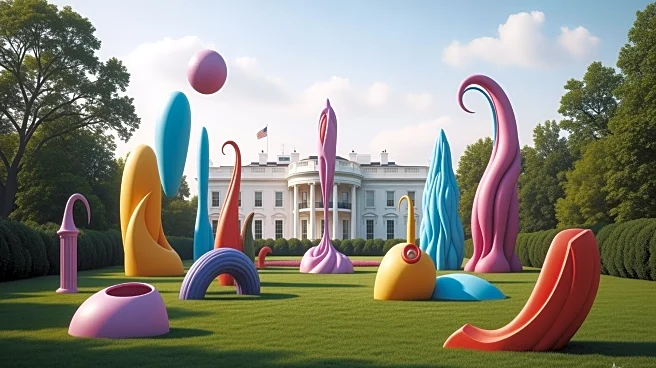What's Happening?
President Trump has initiated significant changes to the White House grounds, including the cementification of the Rose Garden and the demolition of the East Wing to create a ballroom. These alterations
have been met with widespread public disapproval, as they are perceived to disregard historical preservation practices. Chelsea Clinton, a former resident of the White House, expressed concern over these changes, emphasizing the importance of stewardship and historical respect in managing the People's House. The renovations have been criticized for lacking transparency and consultation with historians, contrasting with past practices of involving preservation experts in such projects.
Why It's Important?
The changes to the White House grounds have broader implications for historical preservation and public sentiment. The alterations could set a precedent for future administrations regarding the management of national heritage sites. The public's reaction highlights the importance of maintaining historical integrity and transparency in government actions. The controversy also reflects broader concerns about President Trump's approach to historical narratives, as reports suggest efforts to censor exhibits and erase mentions of significant historical events. This situation underscores the tension between authority and stewardship in managing national symbols and heritage.
What's Next?
The ongoing public debate may prompt calls for more stringent preservation reviews and increased involvement of historical experts in future renovations. Stakeholders such as the National Trust for Historic Preservation may advocate for clearer guidelines and oversight in managing the White House grounds. As the U.S. approaches its 250th anniversary, there may be increased scrutiny on how national heritage sites are preserved and presented. The administration's approach to historical narratives could face further challenges from civil society groups and historians seeking to protect the integrity of American history.
Beyond the Headlines
The alterations to the White House grounds raise ethical questions about the balance between modernization and preservation. The lack of historical consultation in the renovation process may reflect broader societal trends of prioritizing contemporary needs over historical continuity. This development could influence cultural attitudes towards historical preservation and the role of government in safeguarding national heritage. The situation also highlights the potential impact of private funding on public spaces, raising questions about the influence of private interests in shaping national symbols.









